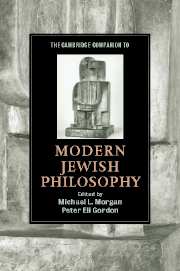Book contents
- Frontmatter
- 1 Introduction: Modern Jewish Philosophy, Modern Philosophy, and Modern Judaism
- 2 Baruch Spinoza and the Naturalization of Judaism
- 3 The Liberalism of Moses Mendelssohn
- 4 Jewish Philosophy after Kant The Legacy of Salomon Maimon
- 5 Hermann Cohen: Judaism and Critical Idealism
- 6 Self, Other, Text, God: The Dialogical Thought of Martin Buber
- 7 Franz Rosenzweig and the Philosophy of Jewish Existence
- 8 Leo Strauss and Modern Jewish Thought
- 9 Messianism and Modern Jewish Philosophy
- 10 Ethics, Authority, and Autonomy
- 11 Joseph Soloveitchik and Halakhic Man
- 12 Emmanuel Levinas: Judaism and the Primacy of the Ethical
- 13 Emil Fackenheim, the Holocaust, and Philosophy
- 14 Evil, Suffering, and the Holocaust
- 15 Revelation, Language, and Commentary: From Buber to Derrida
- 16 Feminism and Modern Jewish Philosophy
- Bibliography
- Index
8 - Leo Strauss and Modern Jewish Thought
Published online by Cambridge University Press: 28 September 2007
- Frontmatter
- 1 Introduction: Modern Jewish Philosophy, Modern Philosophy, and Modern Judaism
- 2 Baruch Spinoza and the Naturalization of Judaism
- 3 The Liberalism of Moses Mendelssohn
- 4 Jewish Philosophy after Kant The Legacy of Salomon Maimon
- 5 Hermann Cohen: Judaism and Critical Idealism
- 6 Self, Other, Text, God: The Dialogical Thought of Martin Buber
- 7 Franz Rosenzweig and the Philosophy of Jewish Existence
- 8 Leo Strauss and Modern Jewish Thought
- 9 Messianism and Modern Jewish Philosophy
- 10 Ethics, Authority, and Autonomy
- 11 Joseph Soloveitchik and Halakhic Man
- 12 Emmanuel Levinas: Judaism and the Primacy of the Ethical
- 13 Emil Fackenheim, the Holocaust, and Philosophy
- 14 Evil, Suffering, and the Holocaust
- 15 Revelation, Language, and Commentary: From Buber to Derrida
- 16 Feminism and Modern Jewish Philosophy
- Bibliography
- Index
Summary
I believe I can say, without any exaggeration, that since a very very early time the main theme of my reflections has been what is called the 'Jewish Question.
Was Leo Strauss a modern Jewish thinker? Was this even a category that Strauss recognized? The question is not an idle one. It is not self-evident that Strauss belongs to the canon of modern Jewish thinkers in which one might expect to find names like Hermann Cohen, Franz Rosenzweig, Martin Buber, Gershom Scholem, and Emmanuel Levinas. His work dealt characteristically with the philosophical tradition rather than the Jewish tradition. His studies on Jewish thinkers and themes occupy a relatively small portion of his total corpus of writing. And his most important (or at any rate, his most widely read) book, Natural Right and History, contains scarcely a word about any Jewish topic. Given these considerations, what has Strauss contributed to modern Jewish thought?
Before trying to answer these questions, some biography. Leo Strauss was born in the Hessian village of Kirchhain in 1899. He was brought up in an observant household, where he remarked later that the Jewish laws “were rather strictly observed.” After graduating from a humanistic Gymnasium and a brief service in World War I, Strauss attended the university at Marburg that was then the center of the neo-Kantian revival inspired by Hermann Cohen. Strauss received his doctorate from the University of Hamburg in 1921, where he prepared a dissertation under the direction of Ernst Cassirer.
- Type
- Chapter
- Information
- The Cambridge Companion to Modern Jewish Philosophy , pp. 147 - 169Publisher: Cambridge University PressPrint publication year: 2007
- 1
- Cited by



